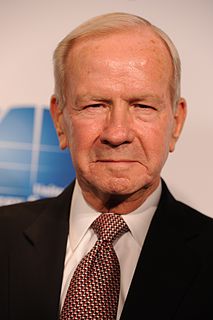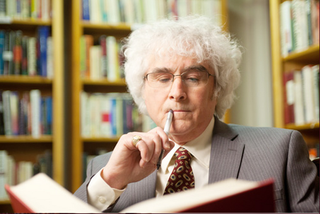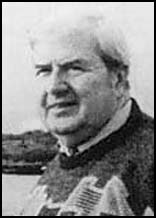
The Iran–Contra affair, also referred to as Irangate, Contragate, the Iran–Contra scandal, or simply Iran-Contra, was a political scandal in the United States that occurred during the second term of the Reagan Administration. Senior administration officials secretly facilitated the sale of arms to Iran, which was the subject of an arms embargo. The administration hoped to use the proceeds of the arms sale to fund the Contras in Nicaragua. Under the Boland Amendment, further funding of the Contras by the government had been prohibited by Congress.

Oliver Laurence North is an American political commentator, television host, military historian, author, and retired United States Marine Corps lieutenant colonel. He was convicted in the Iran–Contra affair of the late 1980s, but his convictions were vacated and reversed, and all charges against him dismissed in 1991.

Robert Carl "Bud" McFarlane is a retired Marine Corps officer who served as National Security Advisor to President of the United States Ronald Reagan from 1983 through 1985.

Félix Ismael Rodríguez Mendigutia is a former Central Intelligence Agency Paramilitary Operations Officer in the famed Special Activities Division, known for his involvement in the Bay of Pigs Invasion and the execution of communist revolutionary Che Guevara as well as his ties to George H. W. Bush during the Iran–Contra affair. He is a Cuban American.
Eugene H. Hasenfus is a former United States Marine who helped fly weapons shipments on behalf of the U.S. government to the right wing Contra mercenaries in Nicaragua. He was the sole survivor after his plane was shot down by the Nicaraguan government in 1986, and was sentenced to 30 years in prison for terrorism and other charges, but pardoned and released the same year. The statements he made to the Sandinista government resulted in a controversy in the U.S. government, after the Reagan administration denied any connection to him.
Manucher Ghorbanifar is an expatriate Iranian arms dealer and former SAVAK agent.
The Tower Commission was commissioned on December 1, 1986 by United States president Ronald Reagan in response to the Iran–Contra affair, in which senior administration officials secretly facilitated the sale of arms to Iran, which was the subject of an arms embargo. The commission, composed of former Senator John Tower of Texas, former Secretary of State Edmund Muskie, and former National Security Advisor Brent Scowcroft, was tasked with reviewing the proper role of the National Security Council staff in national security operations generally, and in the arms transfers to Iran specifically.
Donald R. Fortier was a member of the United States Intelligence Community.
The presidency of Ronald Reagan in the United States was marked by multiple scandals, resulting in the investigation, indictment, or conviction of over 138 administration officials, the largest number for any U.S. president.
Joseph F. Fernandez was a Central Intelligence Agency station chief in Costa Rica and a figure in the Iran-Contra Affair.
George W. Cave was a CIA operations officer and authority on Iran who took part in the Iran-Contra arms sale. George Cave majored in Middle Eastern studies at Princeton University, where he studied from 1952 to 1956, and joined CIA after graduation. One account claims Cave served for the CIA in Teheran during the 1953 Iranian coup d'état that restored the Shah of Iran to power. In the mid 1970s he served in Tehran as deputy CIA station chief, with personal ties to the Shah. He was charged with lying to Congress about CIA's involvement in Iran-Contra. In his final interview Duane Clarridge, former CIA operations officer and Iran-Contra figure, hinted that George Cave's novel October 1980 was a largely accurate depiction of how Reagan's October Surprise transpired.

Daniel P. Sheehan is a Constitutional and public interest lawyer, public speaker, political activist and educator. Over the last forty-five years he has participated in numerous legal cases of public interest, including the Pentagon Papers Case, the Watergate Break-In Case, the Silkwood Case, the Greensboro massacre Case, the La Penca bombing Case and others. He established the Christic Institute and the Romero Institute, two non-profit public policy centers. He has also spoken publicly about UFOs and alien visitation. Since 2015 Sheehan has lectured on American history, politics and the assassination of John F. Kennedy at the University of California, Santa Cruz.
The congressional committees investigating the Iran–Contra affair were committees of the United States House of Representatives and of the United States Senate formed in January 1987 to investigate the Iran–Contra affair. The committees held joint hearings and issued a joint report. The hearings ran from 5 May 1987 to 6 August 1987, and the report was published in November, with a dissenting Minority Report signed by six Republican Congressmen and two Republican Senators.
Operation Tipped Kettle was a 1980s US-Israeli government operation transferring weapons seized by Israeli forces from the Palestine Liberation Organization in Lebanon during Operation Peace for Galilee to the Nicaraguan Contras. The operation was a precursor to the transfer of weapons to the Contras from other sources, in what became known as the Iran–Contra affair.

Roy M. Furmark was a New York businessman who played a role in the Iran-Contra affair in a number of ways, including acting as a link between CIA Director William Casey and Saudi billionaire Adnan Khashoggi, who financed the arms deal at the center of the affair. In 1986 the Los Angeles Times reported that Furmark had known Casey and Khashoggi for about 20 years.
The Iran–Contra affair was a political scandal in the United States that came to light in November 1986. During the Reagan administration, senior administration officials secretly facilitated the sale of arms to Iran, the subject of an arms embargo. Some U.S. officials also hoped that the arms sales would secure the release of hostages and allow U.S. intelligence agencies to fund the Nicaraguan Contras. Under the Boland Amendment, further funding of the Contras by the government had been prohibited by Congress.
The National Endowment for the Preservation of Liberty (NEPL) was a shell company used by Oliver North to provide funds and support the Contras who were fighting the left-wing Sandinista government. The company was a way for wealthy American citizens who were sympathetic to Reagan’s Contra policy to donate large sums of money and arms to Nicaragua. The company used the International Business Communications (IBC) to funnel money to the Contras.








